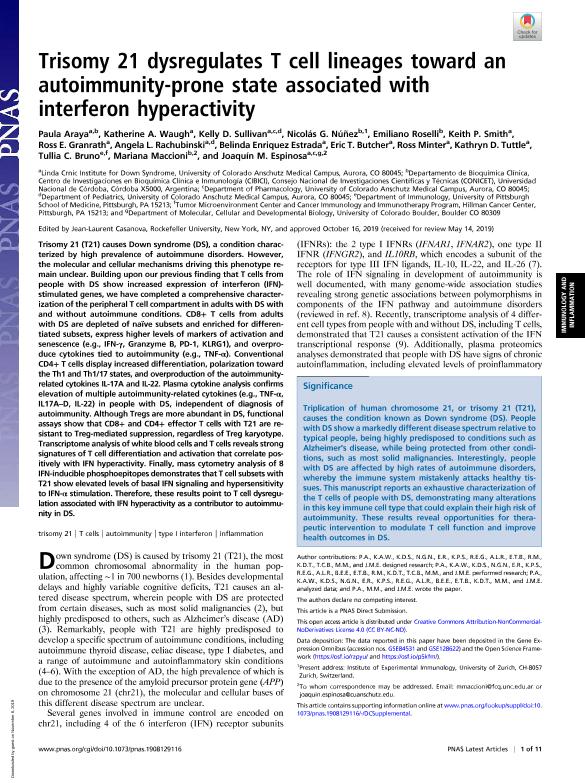Artículo
Trisomy 21 dysregulates T cell lineages toward an autoimmunity-prone state associated with interferon hyperactivity
Araya, Paula ; Waugh, Katherine A.; Sullivan, Kelly D.; Núñez, Nicolás
; Waugh, Katherine A.; Sullivan, Kelly D.; Núñez, Nicolás ; Roselli, Emiliano
; Roselli, Emiliano ; Smith, Keith P.; Granrath, Ross E.; Rachubinski, Angela L.; Enriquez Estrada, Belinda; Butcher, Eric T.; Minter, Ross; Tuttle, Kathryn D.; Bruno, Tullia C.; Maccioni, Mariana
; Smith, Keith P.; Granrath, Ross E.; Rachubinski, Angela L.; Enriquez Estrada, Belinda; Butcher, Eric T.; Minter, Ross; Tuttle, Kathryn D.; Bruno, Tullia C.; Maccioni, Mariana ; Espinosa, Joaquín M.
; Espinosa, Joaquín M.
 ; Waugh, Katherine A.; Sullivan, Kelly D.; Núñez, Nicolás
; Waugh, Katherine A.; Sullivan, Kelly D.; Núñez, Nicolás ; Roselli, Emiliano
; Roselli, Emiliano ; Smith, Keith P.; Granrath, Ross E.; Rachubinski, Angela L.; Enriquez Estrada, Belinda; Butcher, Eric T.; Minter, Ross; Tuttle, Kathryn D.; Bruno, Tullia C.; Maccioni, Mariana
; Smith, Keith P.; Granrath, Ross E.; Rachubinski, Angela L.; Enriquez Estrada, Belinda; Butcher, Eric T.; Minter, Ross; Tuttle, Kathryn D.; Bruno, Tullia C.; Maccioni, Mariana ; Espinosa, Joaquín M.
; Espinosa, Joaquín M.
Fecha de publicación:
11/2019
Editorial:
National Academy of Sciences
Revista:
Proceedings of the National Academy of Sciences of The United States of America
ISSN:
0027-8424
Idioma:
Inglés
Tipo de recurso:
Artículo publicado
Clasificación temática:
Resumen
Trisomy 21 (T21) causes Down syndrome (DS), a condition characterized by high prevalence of autoimmune disorders. However, the molecular and cellular mechanisms driving this phenotype remain unclear. Building upon our previous finding that T cells from people with DS show increased expression of interferon (IFN)stimulated genes, we have completed a comprehensive characterization of the peripheral T cell compartment in adults with DS with and without autoimmune conditions. CD8+ T cells from adults with DS are depleted of naïve subsets and enriched for differentiated subsets, express higher levels of markers of activation and senescence (e.g., IFN-γ, Granzyme B, PD-1, KLRG1), and overproduce cytokines tied to autoimmunity (e.g., TNF-α). Conventional CD4+ T cells display increased differentiation, polarization toward the Th1 and Th1/17 states, and overproduction of the autoimmunity-related cytokines IL-17A and IL-22. Plasma cytokine analysis confirms elevation of multiple autoimmunity-related cytokines (e.g., TNF-α, IL17A–D, IL-22) in people with DS, independent of diagnosis of autoimmunity. Although Tregs are more abundant in DS, functional assays show that CD8+ and CD4+ effector T cells with T21 are resistant to Treg-mediated suppression, regardless of Treg karyotype. Transcriptome analysis of white blood cells and T cells reveals strong signatures of T cell differentiation and activation that correlate positively with IFN hyperactivity. Finally, mass cytometry analysis of 8 IFN-inducible phosphoepitopes demonstrates that T cell subsets with T21 show elevated levels of basal IFN signaling and hypersensitivity to IFN-α stimulation. Therefore, these results point to T cell dysregulation associated with IFN hyperactivity as a contributor to autoimmunity in DS.
Palabras clave:
AUTOIMMUNITY
,
INFLAMMATION
,
T CELLS
,
TRISOMY 21
,
TYPE I INTERFERON
Archivos asociados
Licencia
Identificadores
Colecciones
Articulos(CIBICI)
Articulos de CENTRO DE INV.EN BIOQUI.CLINICA E INMUNOLOGIA
Articulos de CENTRO DE INV.EN BIOQUI.CLINICA E INMUNOLOGIA
Citación
Araya, Paula; Waugh, Katherine A.; Sullivan, Kelly D.; Núñez, Nicolás; Roselli, Emiliano; et al.; Trisomy 21 dysregulates T cell lineages toward an autoimmunity-prone state associated with interferon hyperactivity; National Academy of Sciences; Proceedings of the National Academy of Sciences of The United States of America; 11-2019
Compartir
Altmétricas



